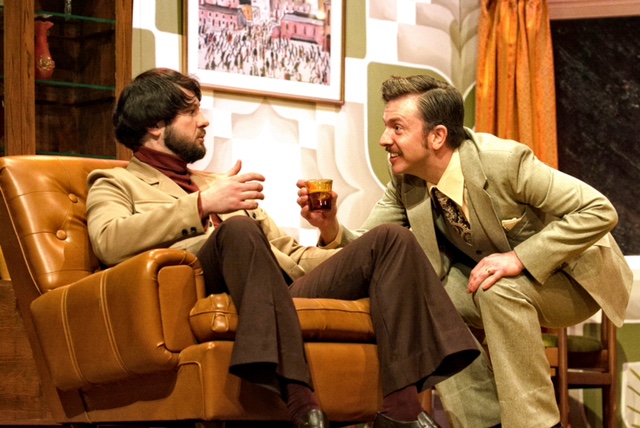
17 – 19 July
Back in the Seventies it was stereos, leather three-piece suites and lit drinks cabinets. Now it’s kitchen islands, quookers and power showers. The suburban dream lives on – as do its aspirational players, forever caught up in the dramas of the domestic stage. When Abigail’s Party was written, writer Mike Leigh referred to a disease he described as ‘doing the done thing’ – where people invest in a ‘keeping up with the Jones’s’ outlook on life while allowing personal frustrations to fester.
Abigail’s Party, a parable of class and sexual politics, was originally staged in 1977 before being televised by the BBC for its Play for Today series. It was watched by 16 million viewers. The play was criticised by Dennis Potter for being what he described as “a prolonged jeer, twitching with genuine hatred, about the dreadful suburban tastes of the dreadful lower middle classes.” Leigh rejected this, citing the play to be more of a tragi-comedy, a lamentation rather than a sneer. “All my plays and films have, at one level or another, dealt with the tension between conforming or being your true self, between following the rules or breaking them, and with the problem of having to behave the way you think you’re expected to.”
The plot is banal – simply, a couple invite some neighbours over for drinks. But as the conversation drills down to uncover the micro detail of their lives – what they say, but what they actually mean – the play packs a subtle punch. Once the veneer of social politeness starts to give way as the conveyor belt of drinks begins to release the inner lives of the hosts and guests, 13 Richmond Road becomes an emotional sink hole as first hosts Beverly and Laurence start to score points off each other, while their guests Angela and Tony, a nurse and computer technician, begin to expose their own issues around Tony’s ‘nastier’ side. Susan, the final guest, a divorcee whose teenage daughter Abigail is having a party back at her house two doors away is the more reserved of the group. Shier, more obviously middle-class, she begins to regret the fact she is a virtual captive at Beverly’s house while her daughter parties at home.
Rebecca Birch began the evening as hostess Beverly. Sadly, no sooner had she flounced off stage to Donna Summer’s Love to Love You Baby, having set out the nibbles before the guests arrived, than the house lights came back on. We were informed Rebecca Birch had been taken ill and Kathryn Cabot who is the Producer for London Classic Theatre stepped in under her stagename Kathryn Ritchie and would continue in the role reading from script. That she took a very warm round of applause at the close was testament to her single-handedly ‘saving’ the show on the night. In her fiery red, plunge-necked evening dress, Ritchie was every bit the frustrated spouse seeking payback from prestige and sexual playfulness, even if she had to juggle an A4 pad around with her.
Tom Richardson played the highly-strung estate agent husband, Laurence, with palpable stress. Alice De-Warrenne’s high-voiced Angela seemed a little too caricatured at times while George Readshaw gave man-of-few-words Tony the necessarily sullenness required of the role. Jo Castleton’s Susan merely had to remain restrained to cut a different path from the other women, although it is she who throws up after too many G&T’s.
Bek Palmer has lovingly recreated a Seventies suburban living room using a blown-up Seventies wallpaper motif for the backdrop and plenty of detail in the furnishings – think light brown sofas and chairs with orange curtains – as well as dressing the hapless men in flared trouser suits – yuck!
Abigail’s Party, while received well here, would probably benefit from the more intimate surroundings of a smaller venue. This intimate piece of observation needs closeness to feed its claustrophobia. While the play remains thought-provoking almost fifty years on, it can stutter, with long passages of filling bottomless glasses making for overly repetitive narrative.
★★★☆☆ Simon Bishop 18 July 2023
Photo credit: Sheila Burnett


